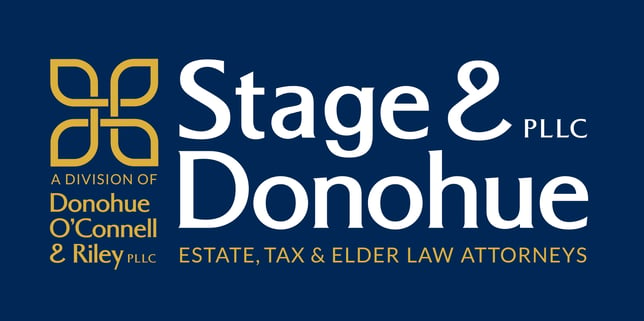Stage Law Firm LLP and the Warwick office of Donohue, O’Connell & Riley PLLC Combine to Form Stage & Donohue, PLLC

The combination will give Stage Law Firm clients the opportunity to benefit from the firm’s local Warwick presence and regional scope for sophisticated estate, tax and elder law planning.
The Stage Law Firm LLP has been in existence for 125 years and is looking forward to the next chapter in the firm’s long history. Attorney Douglas R. Stage met Attorney Joseph M. Donohue of Donohue, O’Connell & Riley PLLC 15 years ago and they found common ground in their deep commitment to helping families in the community with a broad range of quality legal services. The combined firm, Stage and Donohue, PLLC will operate at 11 Oakland Avenue in Warwick.
Doug Stage and his legal staff will be working closely with Joe Donohue and his team to ensure a smooth transition of relationships and files. Clients will be in good hands, as Attorney Stage will continue in an active role as senior attorney with the new firm.
Stage and Donohue, PLLC, a division of Donohue, O’Connell & Riley PLLC, has attorneys admitted in NY, NJ, CT, MA, NH and CA and co-counsel relationships across the country and the world, to help with both local matters and planning that can cross state lines and international boundaries. The firm has advised thousands of clients on how to structure their affairs and businesses in order to minimize taxes and assure the smooth transfer of wealth between generations.
We want to thank you for the privilege of helping you with your legal needs and look forward to serving you and your family in the future.

September 17, 2022
Community, attorneys, anniversary
Donohue, O'Connell & Riley Celebrates 15-year Anniversary in Warwick, New York

In 2007, Attorney Joseph Donohue established the Warwick, New York office at 11 Oakland Avenue. We have been pleased to serve many families and small businesses in the Warwick community over the years. Since founding our flagship office, the practice has grown from a single office to a multi-jurisdictional firm with offices in New York, New Jersey, Connecticut, and New Hampshire. In an effort to better serve the needs of clients in surrounding states, we recently opened a Boston, Massachusetts location. We are also planning an expansion Naples, Florida for our “snowbird” clients. Our practice now serves over 8,000 individuals and businesses and continues to flourish thanks to the relationships we have built with our clients and vendors. We look forward to continuing to serve your families and your colleagues throughout the northeast.
July 18, 2022
Tax Saving, Trust, Asset Protection, Jobs Act, Tax Cuts
Tax Changes Looming on the Horizon

How to position yourself for the sunset of the Tax Cuts & Jobs Act
Effective January 1, 2018 the Tax Cuts and Jobs Act (“TCJA”) more than doubled the federal gift and estate tax exclusion amount, increasing the individual exclusion from $5,450,000 to $11,400,000. Today in 2022, the exclusion is at an all-time high of $12,060,000 per person or $24,120,000 for a married couple.
Currently, federal gift taxes apply to inter vivos transfers of money and assets valued above $16,000 per year, per donor, per recipient. Federal estate taxes apply to the value of a decedent’s taxable estate following death. The federal gift and estate tax exclusion is first applied against any taxable gifts made during a person’s lifetime at the time such gifts are made, and any remaining exclusion is applied against the individual’s federal estate tax.
In practical terms, during one’s lifetime, the federal gift and estate tax exclusion allows a person to transfer assets valued up to the exclusion amount (as well as any future appreciation of such assets) out of his or her taxable estate, whether to a trust or to another individual or entity, free of federal gift tax. After one’s passing, any unused exclusion amount will be applied to the decedent’s taxable estate, and only the value of the estate exceeding the exclusion amount will be subject to federal estate tax at rates up to 40%.
The current enhanced federal gift and estate tax exclusion provides an optimal environment for those seeking to employ tax planning strategies to minimize future estate tax exposure. However, the enhanced exclusion created by the TCJA is set to expire, or ‘sunset’, on December 31, 2025. On January 1, 2026, the exclusion will be reduced by about half to an estimated $6,200,000.
One important consideration to factor into your tax and estate planning is that any exclusion used prior to the 2025 sunset will be first deducted from your post-sunset exclusion amount. Meaning, if prior to the sunset you use $6,000,000 of your federal gift and estate tax exclusion, and in 2026 the exclusion is reduced to $6,200,000, you will only have $200,000 remaining in federal gift and estate tax exclusion at your disposal.
In light of this caveat, one method to consider if married, is to apply all gifts made prior to the 2025 sunset against one spouse’s federal gift and estate tax exclusion, while leaving the other spouse’s federal exclusion untouched. This allows a couple to retain ownership of assets that are difficult to transfer outside of the taxable estate (such as retirement accounts). If one spouse passes with unused federal estate tax exclusion, the surviving spouse can avail him or herself of the deceased spouse’s exclusion via the Deceased Spouse Unused Election (“DSUE”).
It is also important to note that some states, including Massachusetts and New York, impose a state-level estate tax in addition to the federal estate tax. For example, Massachusetts imposes a graduated estate tax ranging between .8% and 16% of the total value of the estate to estates exceeding $1,000,000, and New York imposes an estate tax at rates between 3.06% and 16% on estates exceeding $6,110,000. New Yorkers whose estates exceed 105% of the $6,110,000 threshold (i.e., $6,415,500) will be taxed on the entirety of the value of their estate from the first dollar.
Those whose taxable estates exceed both state and federal taxation thresholds will essentially be subject to a double tax on the value of their taxable estate – one to the federal government at rates up to 40%, and one to the state government at then-prevailing rates. Our attorneys can help you determine how to minimize or eliminate your state estate tax exposure while taking advantage of the enhanced federal gift and estate tax exclusion.
In anticipation of the 2025 sunset, if your assets exceed the applicable estate tax thresholds, you should speak to a tax and estate planning professional to understand your total estate tax exposure and determine options to reduce your estate tax exposure at both a federal and state level. Call us to find out how we may be able to help you.
July 14, 2022
Tax Saving, Trust, Asset Protection, Will, executor help
12 Common Misconceptions About Estate Planning
 1. Wills avoid Probate.
1. Wills avoid Probate.
FALSE: Wills don’t avoid probate; in fact, they all but guarantee it. Probate can be a long and expensive process, in which a court decides whether to admit a will to allow administration of an estate. Even the simplest probate process typically can last a year or more and involve significant expense. If you have real estate in more than one state, each property may have to go through probate in its respective state. Additionally, all heirs – those who would take if the will is found invalid – must be notified of the probate even if they are excluded from the will. This can result in painfully detailed genelogical research at times. Therefore, while a will provides the court with guidance on your wishes, it doesn’t avoid the probate process – only a trust can do that. For more information on avoiding probate potholes, read our recent blogpost, www.docrlaw.com/articles/probatepotholes
2. There will be a reading of the will.
FALSE: A reading of the will is one of those classic movie moments but, while dramatic and compelling, this never happens today. Wills were read before photocopies were invented, in times when many people were illiterate. Normally, people will have told their executors or family members that they have drafted a will, and where it is stored. Your family will be able to read your will after you die, usually in the form of photocopies, but they will not gather in a room and have your lawyer read the document out loud.
3. My will controls all my assets.
FALSE: A will normally controls the assets in your name upon your death, but there are certain assets that you own which are not subject to probate. In other words, these assets are not subject to the terms of your will. The first and most common type is jointly owned property, which frequently passes automatically by right of survivorship. If a jointly owned property has the right of survivorship – a common arrangement between spouses – your portion transfers into the hands of the surviving owner at death. Additionally, certain assets (life insurance policies and retirement accounts) usually pass by a beneficiary designation, and will pass directly to the named beneficiary (whether an individual or a trust) instead of having to be subject to review by the court. Similarly, some clients have bank or investment accounts that pass via a POD ("Payable On Death") or a TOD ("Transfer On Death") arrangement. These are likewise not controlled by a will.
4. If I die without a will, everything goes to the state.
FALSE: If you pass without a will, each state applies what are known as “laws of intestacy” to determine who will inherit what and how your property will pass upon your death. In most states if you are married with children, the estate is given half to your spouse, with the remaining half being divided among your children. If someone is single everything will generally pass to their children, if they have any. However, minor children cannot inherit assets, so the court will appoint someone to take care of those assets until the children reach the age of majority, usually 18 or 21. The only way a government will inherit your estate is if you die intestate (without a will) and have no identifiable surviving heirs or creditors. In this case the state where you reside would inherit your property, which is a very rare occurrence.
5. I don’t need a will – my spouse has Power of Attorney over all of my accounts.
FALSE: A power of attorney is a legal document that lets someone you trust stand in for you when it comes to certain legal, financial, or medical matters. Depending on what type of power of attorney you create, your agent then can make decisions about property or money (a financial power of attorney) or over healthcare decisions (healthcare power of attorney or healthcare proxy). When creating this document, you decide when it goes into effect, and what powers your agent may exercise. Unfortunately, though, a power of attorney ceases to be effective on death. That is where a will or trust takes over.
6. I downloaded a will - that's good enough.
FALSE: Some people may be attracted to going online and inputting their information into a will-creating software, but as fascinating as this technology may seem, these online wills may not be the best fit for you and your family. Online wills don’t involve the advice and expertise of an attorney during drafting, and most times these online services use vague language or general terms that may not apply to your situation. Additionally, wills created online almost never take into account tax and long-term care planning. Lastly, for a will to be recognized as a legal document it must be witnessed by two or three people – depending on the state laws. Improper execution – a common mistake we see in DIY wills – gives an opportunity for the will to be contested in the future, which can be costly and time-consuming, and lead to the imposition of unexpected taxes.
7. I will never go into a nursing home.
FALSE: Although many of us don’t like to consider the possibility of living at a nursing home or a long term care facility when the time comes, the reality is some people may need to move into these facilities so they can receive the care they need. Studies show that 69% of adults age 65+ will likely need in-home, assisted living or nursing home care. An aging spouse and family members can only do so much. While it is not a pleasant consideration, early planning is critical based on the stringent 5-year look back rules imposed by Medicaid, and the need to get long term care insurance before you receive a critical diagnosis. Failure to plan for this type of care can destroy even the best laid retirement plans, and rob you and those you love of your life savings.
8. I can do a DocuSign, right?
FALSE: As technology has slowly taken over our daily lives with our smartphones, smart TVs, smart thermostats, and even smart cars, there is still one field where old-fashioned pen and paper is still required: Trust and Estates. Most jurisdictions will not accept electronic signatures on customary estate planning documents like trusts, wills, and codicils. The Federal E-Sign Act and the Uniform Electronic Transactions Act (‘UETA’) also prohibits using electronic signatures to sign wills or testamentary trusts.
9. It’s good to name your Estate as an IRA beneficiary.
FALSE: You are allowed to name anyone, including non-persons, as the beneficiary of your IRA. Examples of non-persons include charities, a trust, or your estate. Although possible, it is not recommended to name your estate as the beneficiary of your IRA because this may create a greater tax liability upon your passing. Another downside to naming your estate as the beneficiary is that, under the IRS rules, your estate is not a “designated beneficiary” which means it has no life expectancy and can’t take advantage of the “stretch IRA” concept. It is best to name your spouse as the beneficiary as he/she will be able to rollover the IRA to his/her own name. You may also want to name your children as contingent beneficiaries, so long as your children are competent adults. On the other hand, naming a trust as the beneficiary of an IRA may be a better fit if you are looking to protect the assets, and ensure they are used appropriately and not squandered. If the trust is not drafted properly and carefully, the IRA might be paid out on an accelerated schedule rather than letting each heir have the option to draw it out over a period of years.
10. Grandma's word is her bond.
FALSE: When it comes to inheritance, only written bequests carry weight. While Grandma may have had the best of intentions, she may have promised the same real or personal property to multiple people in an effort to make everyone happy. Moreover, Grandma’s actions during her lifetime supersede her promises. If Grandma gave away her property during her lifetime, there may be nothing left for her to give upon her passing, despite her “promises”. In addition to having an appropriately executed will or trust, we regularly advise clients to leave written instructions for the executor or trustee regarding how tangible personal property (that is furniture, cars, and jewelry) should be distributed. Without instructions, the executor alone can decide how to distribute furniture, jewelry and other family heirlooms.
11. Marriages are for life.
FALSE: Failure to consider the effects of divorce in estate planning can result in a former spouse being the beneficiary of certain assets upon your death, if not updated after the divorce is final. Although in most states an ex-spouse will be automatically disinherited, not updating your documents may result in them managing your grandchild’s inheritance or owning a property jointly with your family members. An example of this situation happening can occur if you die intestate while your son/daughter is going through a divorce, if before the divorce has been finalized, he/she dies intestate. This would likely result in their former spouse now being both a part owner of your summer vacation home and trustee of your grandchild’s inheritance.
12. Trusts are only for rich people.
FALSE: There are numerous benefits for choosing a trust (revocable or irrevocable) over a will. Trusts are much easier and faster to administer than wills, given that trusts avoid probate altogether, and they may even provide you with tax savings and other advantages in the long run. Additionally, a trust may be more cost-effective depending on your family situation, and may help you protect assets from long term care expenses and other creditors. Lastly, trusts allow for nearly seamless transfers of power over assets between the grantor, the trust, and the beneficiaries. Though they initially cost more to draft, they can save significant time, taxes and money in the long run.
January 7, 2022
Tax Savings, Will, Elder Care, Estate taxes, executor help
Five Common Mistakes Made by Executors & How to Avoid Them

Administering a trust or an estate is an important responsibility. In addition to keeping track of all relevant assets, income and expenses, executors must attend to the interests of the beneficiaries while often undergoing the grieving process themselves. Here are five common mistakes to avoid:
1. Failure to Consider Carrying Costs
Carrying costs can quickly accumulate and eat away at the value of an estate, so when it comes to the estate settlement process, time is money. The executor should ensure that ongoing costs such as property taxes, insurance and lawn care or snow removal are met, while acting decisively to liquidate assets that cost the estate money.
Other costs may include making necessary repairs and reviewing insurance coverage for a vacant home. It is recommended that the executor organizes the sale or transfer of the home as soon as is practicable.
2. Failure to Consider Opportunity Costs
Just as the value of a decedent’s residence is subject to carrying costs, there are opportunity costs to leaving assets in an estate as well. Inflation will inevitably diminish the value of assets held in an estate. Also, some assets may be subject to unexpected losses and could be put to better use in other investments or be used to pay down debt and thereby reduce interest payments and fees. Over time, these opportunity costs can reduce a person’s legacy by 10 percent per year or more. A prudent executor will work quickly to gather and distribute all assets from the estate as soon as is legally permissible, giving the beneficiaries the opportunity to use or grow their inheritance.
3. Sentimentality and Slow Decision Making
As the executor of a loved one’s estate you will need to process your own grief while also making practical decisions. It may be helpful to think of your role as an executor as a professional responsibility, separate from your obligation to the decedent as a family member or friend. This will give you the distance to make business-like decisions for the estate, and not sink into sentimentality. The decedent trusted you to be organized, diligent and professional in carrying out their final wishes in a prudent and expeditious fashion. If the decedent was a loved one, it may be beneficial – even healing – for you and other beneficiaries to spend some time examining their possessions and revisiting memories. Beware, though, of getting lost in minutiae as it can quickly increase your costs while not significantly increasing your inheritance.
4. Not Hiring Professional Help
Many individuals adopt a “do it yourself” approach to administering an estate instead of hiring professionals, such as accountants, appraisers, lawyers and contractors. What many people don’t realize is that by “DIY-ing” it, the savings to any one beneficiary is low, but the liability for the executor can be extremely high. If you or another non-professional unknowingly violate building codes, miss deadlines, or simply fail to acquire necessary licenses or permits, beneficiaries may seek to impose liability. In addition, a good accountant and attorney are well worth their fees for what they may save you in taxes and time.
5. Ignoring the Calendar
Be sure to keep track of tax filing dates, real estate cycles, and seasonal costs. For most clients, filing estate and trust income tax returns on a calendar year (vs. fiscal year) basis makes the most sense. As a result, you will want to keep an eye on the calendar so that you can reduce the number of years required for filing returns. Imagine a client who passed away late in the year: most likely, it will be impossible to close out his or her estate in a few months, and therefore tax returns may be required for two years at least.
Real estate cycles are also important to keep in mind regarding the sale of the decedent’s home, which is often their largest asset. Allow appropriate time to clear out a residence, make needed repairs, and hire professional cleaners to present the property in a good light, but do not embark on a program of major capital improvements. Realtors say that March, April and May are the best months to list a home, while November and December are the worst. In addition to putting a home on the market when it has the best chance of selling for a high price, it is important to think about allowing yourself enough time between the sale and the applicable filing deadlines to file all necessary paperwork and tax returns.
Summing Up
As you can see, an executor is trusted with dozens of projects, many of which interrelate. Getting stuck at any one stage can lead to delays and disruptions which over time compound and can create enormous opportunity costs which in turn can result in liability to the executor or trustee. Navigating the winding path between decisive action and careful consideration can prove tricky without the guidance of a seasoned professional. At Donohue, O’Connell & Riley, our attorneys have “seen this movie before” and even though this might be your first time serving as an executor or trustee, it is definitely not ours. Our attorneys have collectively spent over 100 years administering trusts and estates and can guide you along the long road to the conclusion of the estate administration process, while providing an independent perspective at one degree of removal from the difficult emotional circumstances that you will be handling.
January 7, 2022

